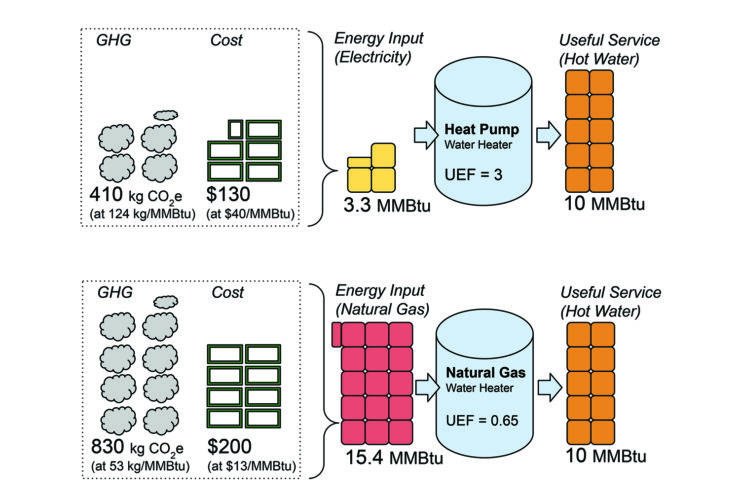Hot water and industrial heat are foundational energy services, but with water heaters tucked in a closet or garage, and factories behind fences, the energy consumption of these applications isn’t always apparent. This year, our team analyzed the energy use of hot water and industrial heat, and found that both systems are currently a major source of greenhouse gas emissions.
In our latest report, we describe the potential for electric heat pumps to simultaneously reduce customer costs and emissions while helping to stabilize the electrical grid. One of the greatest challenges we face today is how to bring more renewable energy onto the grid while making it more reliable and adaptable to climate change. Heat pumps are especially well-suited for this need: with their hot water tanks acting like a thermal battery, they can provide a lot of flexibility during critical peak stress events like the ones that have led to rolling blackouts in the last few years.
This report provides policy recommendations to support the deployment of heat pumps on a national basis. Our recommendations include a wide range of ideas, including incentives, reforming ENERGY STAR ratings, using federal procurement, targeting low-income household needs, and thinking about heat pump deployment as a stimulus opportunity. Our analysis also suggests that developing low-carbon heating technology could create tens to hundreds of thousands of jobs in order to meet demand in the United States and support deployment around the world.

I’m excited about this report because it clearly outlines the opportunity to decarbonize this major sector of our energy system, representing 10% of energy sector emissions in the United States.
In addition to finding that heat pumps are cost effective and carbon friendly, we worked hard to provide actionable advice to policymakers who could make a difference.
Peter Alstone
This work was funded by the Center for Applied Environmental Law and Policy. Partnering with us on this report was energy policy expert Evan Mills. The Schatz Center’s team included Peter Alstone, Jerome Carman, and Alejandro Cervantes, and we are grateful for contributions and review from numerous collaborators.
- Download the report
- For more information, please contact: peter.alstone@humboldt.edu














